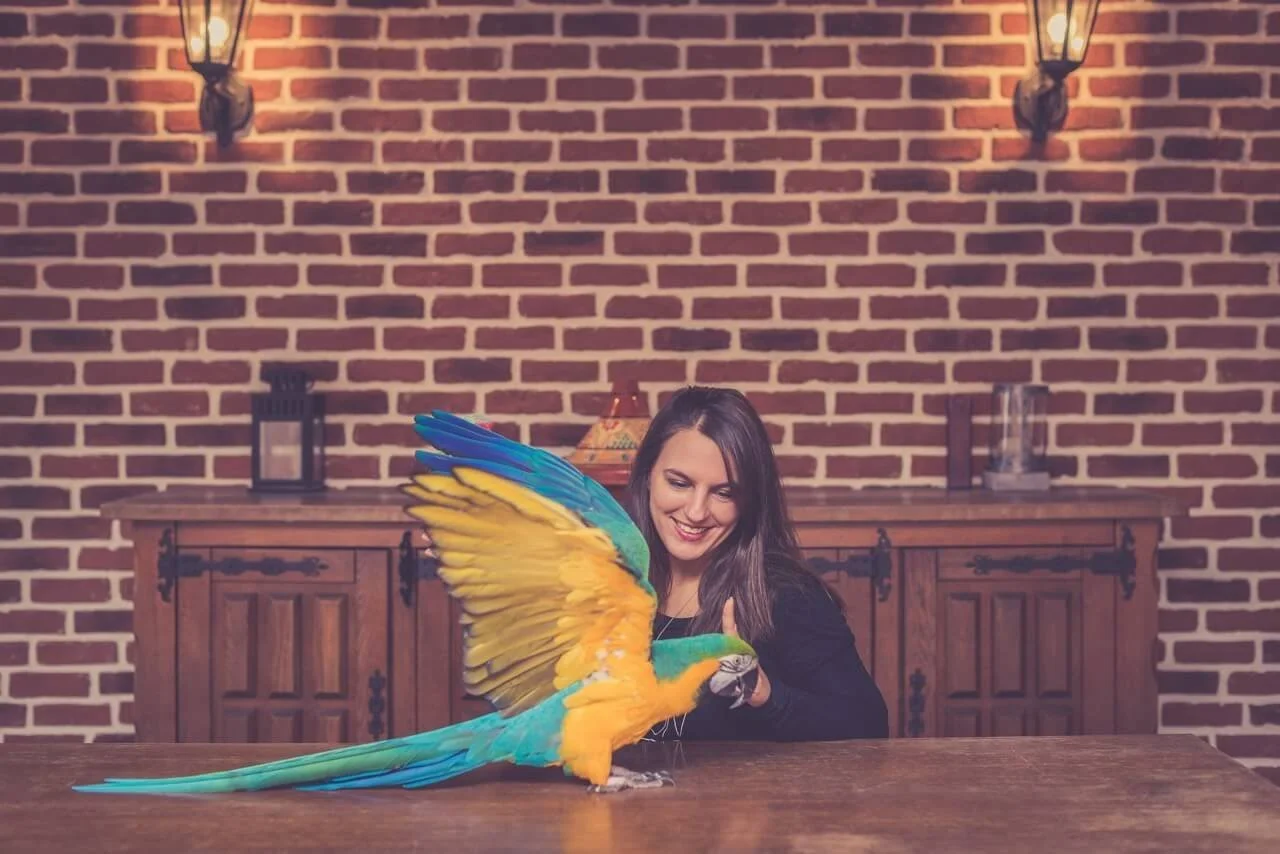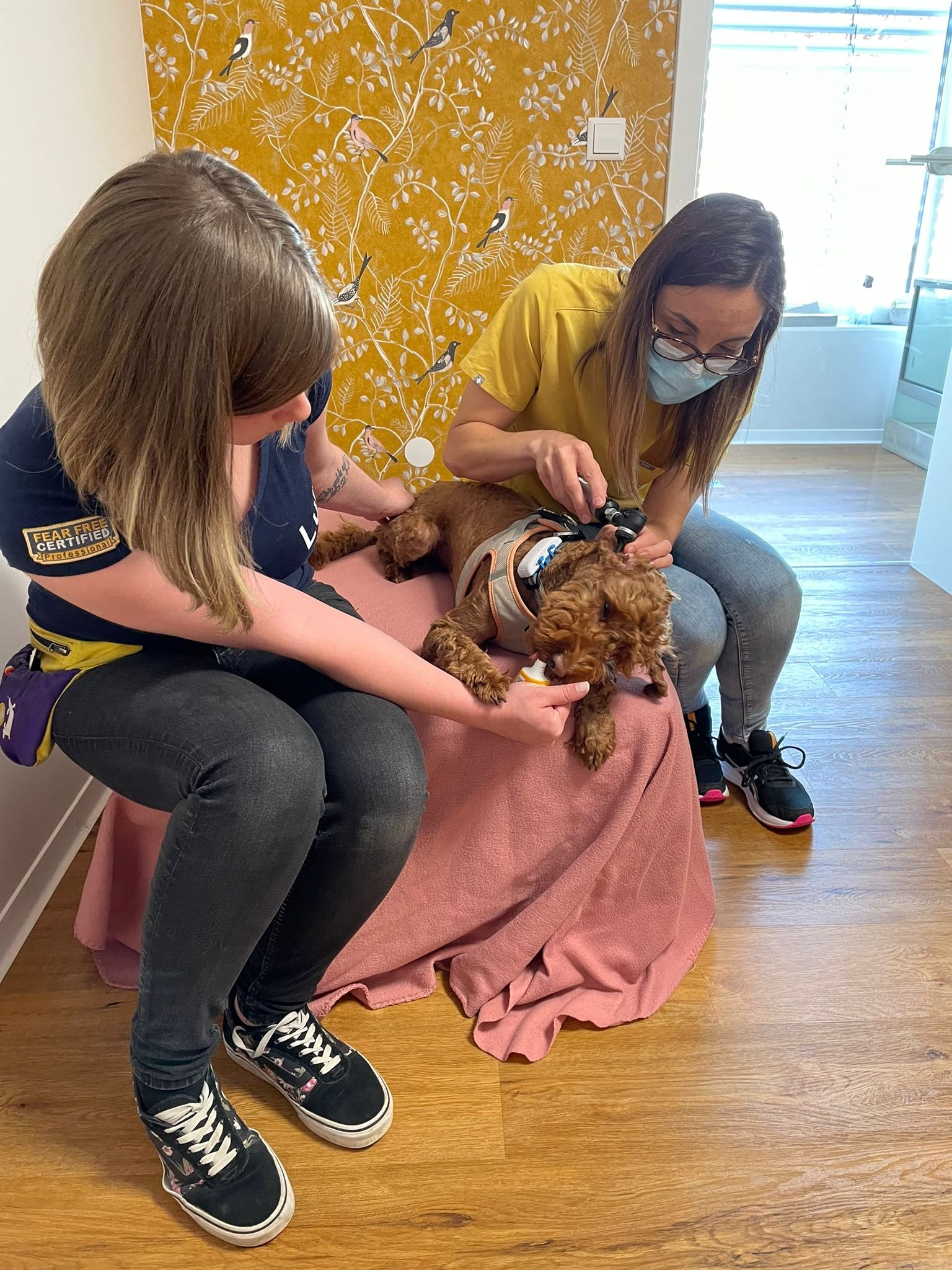Why multidisciplinarity is essential for animal training
Multidisciplinarity is the grouping of several people, several complementary professions working around a common work, each bringing a specific point of view. This approach allows us to increase our knowledge on a theme thanks to the different perspectives of experts on the same situation.
• From dog trainers to dog whisperers
Animal training brings together a wide range of professionals: educators, trainers, behaviorists, behavior consultants, dog whisperers, all have the objective of educating or re-educating pets.
In France, and in most other countries in our world, these jobs are not protected. This means that no diploma or experience are required to practice. Due to the non-legislation of these professions, a significant gap exists between belief and science.
Behavior as a science
Animal behavior is studied under the guise of several sciences.
Two of the main sciences currently applied by the various animal education professions are applied behavior analysis and ethology.
What is ABA ?
ABA is the acronym for Applied Behavior Analysis.
It is a science dedicated to understanding and improving individual behaviors.
Behavioral analysts and consultants emphasize research-based interventions, techniques, and methods to understand, modify, and improve target behaviors and use scientific methods to achieve desired behavioral changes.
ABA is therefore a scientific approach that aims to discover the environmental variables that influence the appearance of individual behavior and to develop behavior modification technologies based on these findings.
What is ethology ?
Ethology is an approach to the study of animal behavior that emphasizes the observation of many different species in an environment close to their natural habitat.
Applied ethology, on the other hand, is the study of the behavior of animals that are subject to management by humans, the objective of which is to improve the welfare of captive animals.
Other sciences approach behavior from different perspectives including zoology, anthropology, biology, psychology, neurosciences, genetics, ecology, to name just a few.
Veterinary medicine
Veterinary medicine is a medical specialty concerned with the prevention, diagnosis and treatment of diseases affecting the health of non-human animals.
If veterinary medicine does not directly study the behavior of animals, the diseases it studies can on the other hand influence it enormously.
Under this science, several specialties can be found: general medicine, nutritionist, behaviorist, ophthalmologist, cardiologist, and so on.
As with humans, each specialty includes experts in an object of study.
According to a Study by Fatjó et al from 2006, more than 98% of veterinarians are regularly consulted by owners for behavior problems in their pets.
More than 99% of veterinarians consulted for this study admitted that finding a solution to the problem was their responsibility. The solutions provided were distributed as follow :
- 46.2% of cases were referred to veterinarians whose specialty is behavior (veterinarian-behaviorists)
- 12.3% of cases were referred to dog trainers or behavior consultants
- 34.7% of cases were treated by general veterinarians without being referred
According to this survey, the willingness to refer a case to a colleague depends on his specialty. In fact, only 51% of veterinarians surveyed considered referring cases to veterinary behaviorists, while this percentage rose to 94% for ophthalmologists and 88% for orthopedics (Thomson Veterinary Health Communications 2003).
This may suggest that behavior sciences are still little known and acclaimed by veterinary medicine.
Blame it on bad luck?
As an animal behavior consultant, I work closely and almost daily with veterinary teams.
Oftentimes, pet health issues lead to undesirable behaviors.
Constipation, cystitis, kidney or liver problems can lead to cleanliness "accidents" in dogs and cats.
Vision problems, thyroid problems, invisible pain, can lead to aggression in parrots and dogs.
Diet can also be the cause of undesirable behaviors. If all the studies conclusions are not necessarily unanimous, a solemn conclusion is that the food offered to a dog or a cat can influence their behavior, whether in terms of quality (protein, carbohydrate, or even sugar levels) or quantity (hunger, for example, can cause behavioral problems).
In the same way that some humans with a cold become more susceptible and irritable, animals with medical conditions may exhibit undesirable behaviors.
Knowing how much health influences behavior, dog trainers and behavior consultants who face unusual, aggressive, anxious or reactive behaviors in their clients' pets will ask owners for medical check-ups or examinations and investigations at their veterinarian.
It may then happen that general veterinarians refuse to carry out the examinations because the request does not seem relevant to them.
We find ourselves with a divide, a gap, between trainers and veterinarians.
This situation, although less and less frequent, pushes trainers to rant on social medias, or even in conferences.
But does our tendency to underestimate vets really come from a lack of interest or respect for our profession on their part or from our lack of training and communication skills?
Working together
Veterinary medicine necessarily requires many years of study and a doctorate.
Animal training does not require anything.
If our discipline is based on science, any professional, regardless of their level of training, knowledge, skills and experience can be brought to practice.
Based on this simple fact, it seems absolutely normal and legitimate to me that veterinarians may show reluctance when it comes to working in collaboration or referring one of their patients to an training professional.
Also, by dint of criticizing the order of veterinarians and their reluctance to work with us, we lose their trust.
So how can we increase veterinarians' trust in us?
• Let’s demonstrate responsibility by educating ourselves in depth about our discipline. This goes through :
o a solid basic education in behavior sciences
o continuing education (since science is constantly evolving, continuous learning is absolutely necessary to be a good professional in animal training), through courses, seminars, conferences, internships, workshops, and so on.
o recognized certifications in our field
• Let’s show humility and let’s stay in our line, without going beyond our knowledge and our skills.
o Only a veterinarian can prescribe medication
o The veterinarian is the only professional who can issue medical opinions
o The veterinarian is the only one who can carry out a clinical examination of the animal
• Let’s specialize our services instead of trying to train everything
o The world of animal training is booming and we can find expertise in a lot of different fields:
* Dog sports
* Cooperative care
* Daily behavior training
* Reactivity
* Separation anxiety
* Etc etc etc
o If we want to be competent in our job, it is impossible to practice all the themes related to canine education. Educating ourselves properly requires a lot of time, energy, work, experience, money. By wanting to “touch everything”, we are ultimately “average in everything”. To specialize means to devote our learning, training, internships, experiences, to a particular field and to practice only in relation to it. This makes us more efficient and much more credible.
Sharline Cully, MS ethologist, Sharline & Cie – Lindsay Tonneau, dog trainer specializing in cooperative care, Lupi – Lisa Longo, behavior consultant specializing in reactivity, aggression, phobia and anxiety, Animal Académie
• Let’s be skeptical of pseudo-science regardless of our personal beliefs.
• Let’s demonstrate respect in our interactions with other professionals.
Working together, a benefit for all parties involved
When dog trainers/behavior consultants and veterinarians decide to work together alongside owners and their pets, there are many advantages and benefits for everyone:
Veterinarians:
- Being able to trust the expertise of the behavior professional
- Limit the hours spent training on a theme/looking for solutions for a specific case
- See the animal more often, thanks to the work done by the trainer, the stress and fear of the animal in the office can decrease, making the owners go there more regularly
- Limit medical problems thanks to more regular check-ups
- Limit biting and other aggressive behavior thanks to the desensitization work carried out by the trainer
Dr. Aubrey Ross and co-workers
Behavior Consultants / Trainers:
- Being able to trust the expertise of the veterinarian
- To be able to obtain medical answers to determine if a pathology influences the dog's behavior
- Being able to see more pets referred by the veterinarian
- Being able to intervene on behaviors as soon as possible to prevent them from becoming too important and invasive
- Increasing client confidence by working in collaboration with their veterinarian
Lindsay Tonneau, Elite Fearfree Trainer, Cooperative Care Instructor, Lupi, and Dr. Laurence Palleva, Fearfree Veterinarian, Pallevet Practice, work together to ensure Cooper has a comfortable time during his care at the practice
Clients :
- Being able to feel surrounded by a team invested in solving the problem encountered
- Reduce the stress of going to the vet
- Have a privileged contact, regular and presence at home to help them learn new skills
- Have an animal that potentially lives longer thanks to more frequent visits to the veterinarian
Animal :
- Learning new skills
- Respect for emotions
- Reduced stress at the vet
- Treatment adapted to pathologies more quickly implemented
- Increased general well-being
Which professional to turn to first?
As a pet owner, it can sometimes be difficult to know where to turn when you encounter a problem with your pet.
If it is obvious to everyone that only a veterinarian can treat an illness or an injury, the reflection arises when the problem encountered comes from the behavior emitted by the animal.
The more trainers and veterinarians work side by side and hand in hand, the better individuals can be referred to the right person to help them.
In general, the education of a young animal should be accompanied by a dog trainer.
The training of cooperative care should be followed-up by a dog trainer (preferably working with a veterinary team or the owners' veterinarians).
Behavior problems that do not impact the direct safety of the animal and other individuals can be monitored by a dog trainer (jumps, walking on a leash, recall, etc.).
Behavior issues impacting the physical or emotional safety of the animal or individuals around it should be monitored by a veterinarian-behaviorist and an animal behavior consultant (reactivity, phobia, aggression, anxiety, ...).
The benefits of Sciences sisters
Dr. Susan G. Friedman, professor emeritus of psychology at the University of Utah and a pioneer in behavior analysis applied to captive and companion animals, talks about Science-sisters for all scientific disciplines exploring the same theme under a different spectrum.
I am particularly attached to this image because even if our looks are different, they are closely linked and forever attached.
We don't need to fight over whether the school of ethology is "better" than the school of behavior analysis.
We don't need to fight over whether Skinner is more important than Tinbergen.
We need both of these sciences just as much, and all those that revolve around behavior.
Our understanding of our pets can only be greater, precise, useful and interesting.
If I put on my glasses as a behavior consultant who bases her approach on ABA, that does not mean that I deny ethology, biology, neuroscience or cognition.
And quite the contrary! Knowing the main characteristics of breeds, their ethogram, knowing the cognitive abilities of dogs, understanding how they see the world with their nose, knowing what mechanisms are activated in their brain depending on the environment, understanding their hormones and their influences on behavior, and so on, all this allows me to be a better professional.
To be competent in my work, I chose to focus on a theme, in a field of study. And thanks to multidisciplinarity, I can refer cases that go beyond my knowledge and skills to great colleagues (trainers, ethologists, general veterinarians, veterinarians with specialties, ...).
I also work as needed with pet-sitters, dog-walkers, groomers, associations, …
And together we all work with a common goal : to increase animal welfare on a daily basis.

















